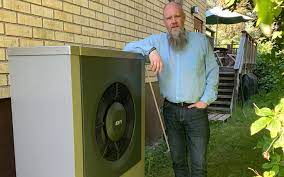Using the growing requirement for sustainability as well as performance, the application of heat pumps has changed into a well-known replacement for conventional heating systems. Heat pumps have transformed the way you use energy in cooling and heating our residences, places of work, and qualities. When standard furnaces or central heating boilers burn off fuel to generate heat, heat pumps exchange heat in one location to yet another making use of electrical power, which makes them environment friendly and expense-efficient. In this blog site, we check out the effectiveness, pros, and negatives of heat pumps to assist you make a well informed heating system decision.
Just what is a Heat Pump?
heat pump (värmepump) are air conditioning solutions that can move heat involving the indoors and outdoors. They normally use a refrigeration pattern to go heat from the outside to the inside of a building in the wintertime and the complete opposite in the summer months. In the winter months, a heat pump takes up heat from the outdoor air flow and transfers it inside your home, when in summer time, it takes up indoors heat and techniques it outside, delivering heat manage and comfort all through the year.
Benefits of Heat Pumps
Heat pumps have several advantages who have manufactured them well-liked by property owners and home developers. To start with, they are power-effective and may preserve approximately 50Per cent in heating system fees when compared with classic warming methods such as furnaces or central heating boilers. Moreover, heat pumps are versatile and may be set up in any residence, regardless of sizing or place. They offer not just heating and also chilling, dehumidifying, and atmosphere purification, causing them to be an all-in-a single solution for inside comfort requirements. Last but not least, heat pumps use a longer lifespan and are much less prone to deteriorating, with proper installing, routine maintenance, and fix.
Drawbacks of Heat Pumps
While heat pumps have quite a few benefits, they already have some negatives that may decide when they are ideal for your heating demands. One commonly recognized disadvantage is simply because they require electrical energy, which may be a problem in regions with higher electric power prices. Additionally, heat pumps call for outdoor space to set up, which may be restricted in a few downtown locations. Finally, heat pumps demand correct sizing, installing, and upkeep for optimum overall performance, that may be expensive and time-ingesting.
Kinds of Heat Pumps
Heat pumps can be found in three varieties: air-source, soil-source, and water-provider heat pumps. Air-supply heat pumps are the most frequent, plus they use outdoor air flow as their heat resource. Ground-supply heat pumps, also referred to as geothermal heat pumps, make use of the floor his or her heat provider, when h2o-source heat pumps work with a normal water source such as a lake, stream, or well. Floor-provider and water-supply heat pumps tend to be more efficient but are more expensive to put in and maintain.
Conclusion:
Heat pumps have transformed the way we heat and cool our homes and components, with their vitality-effective, eco-helpful, and adaptable technology. Their quite a few advantages and couple of disadvantages make sure they are ideal for anybody who desires to bring down home heating expenses and lower their carbon dioxide footprint. As well, homeowners and property builders should consider the kind of heat pump that best suits their heating system requirements, price range, and location. With appropriate sizing, installing, and routine maintenance, heat pumps can last approximately 20 years and give interior ease and comfort throughout every season. Hopefully this information has really helped you understand the productivity, advantages, and drawbacks of heat pumps and then make a well informed determination when choosing your heating system.


